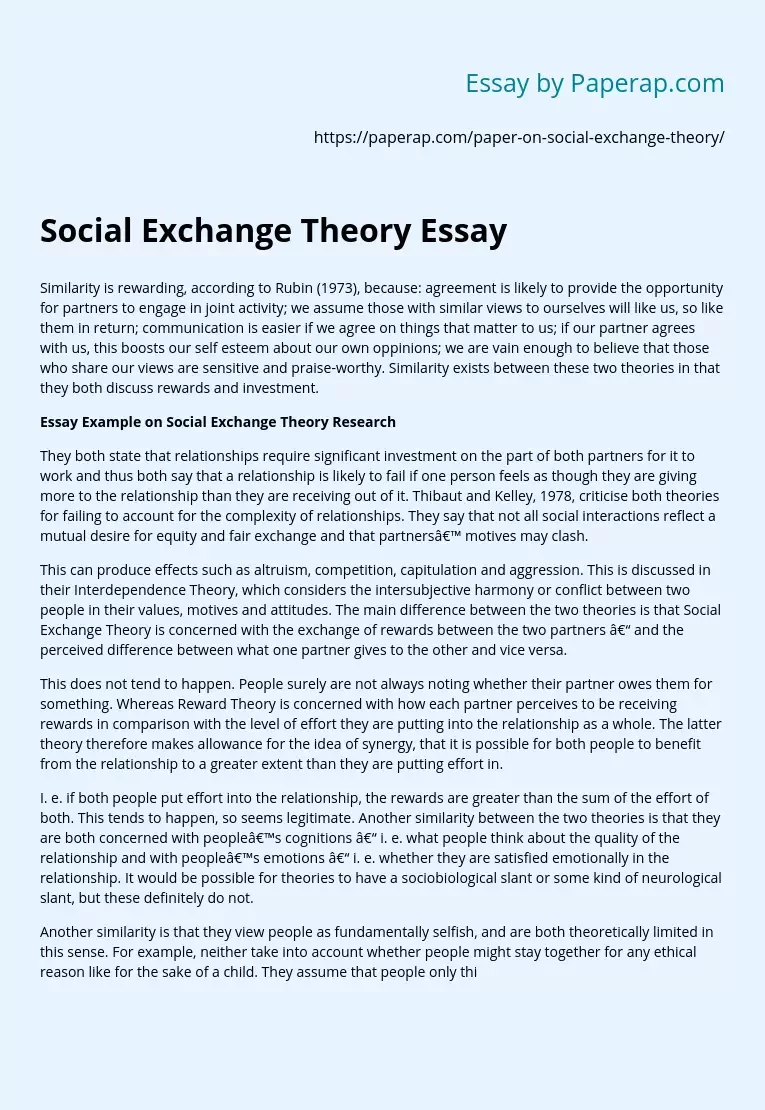Social Exchange Theory Essay
The following sample essay on Similarity is rewarding, according to Rubin, because: agreement is likely to provide the opportunity for partners to engage in joint activity; we assume those with similar views to ourselves will like us, so like them in return; communication is easier if we agree on things that matter to us; if our partner agrees with us, this boosts our self esteem about our own oppinions; we are vain enough to believe that those who share our views are sensitive and praise-worthy.
Similarity exists between these two theories in that they both discuss rewards and investment.
Essay Example on Social Exchange Theory Research
They both state that relationships require significant investment on the part of both partners for it to work and thus both say that a relationship is likely to fail if one person feels as though they are giving more to the relationship than they are receiving out of it. Thibaut and Kelley, 1978, criticise both theories for failing to account for the complexity of relationships.
They say that not all social interactions reflect a mutual desire for equity and fair exchange and that partners’ motives may clash. This can produce effects such as altruism, competition, capitulation and aggression. This is discussed in their Interdependence Theory, which considers the intersubjective harmony or conflict between two people in their values, motives and attitudes. The main difference between the two theories is that Social Exchange Theory is concerned with the exchange of rewards between the two partners – and the perceived difference between what one partner gives to the other and vice versa.
This does not tend to happen. People surely are not always noting whether their partner owes them for something. Whereas Reward Theory is concerned with how each partner perceives to be receiving rewards in comparison with the level of effort they are putting into the relationship as a whole. The latter theory therefore makes allowance for the idea of synergy, that it is possible for both people to benefit from the relationship to a greater extent than they are putting effort.
I. e. if both people put effort into the relationship, the rewards are greater than the sum of the effort of both. This tends to happen, so seems legitimate. Another similarity between the two theories is that they are both concerned with people’s cognitions – i. e. what people think about the quality of the relationship and with people’s emotions – i. e. whether they are satisfied emotionally in the relationship. It would be possible for theories to have a sociobiological slant or some kind of neurological slant, but these definitely do not. Another similarity is that they view people as fundamentally selfish, and are both theoretically limited in this sense. For example, neither take into account whether people might stay together for any ethical reason like for the sake of a child. They assume that people only think about themselves, and it is almost as if the two people are not in love at all. If they were in love, you would think that they would want to help their partner, rather than only doing so in expectation of a reward.
Social Exchange Theory Essay. (2019, Nov 27). Retrieved from https://paperap.com/paper-on-social-exchange-theory/

